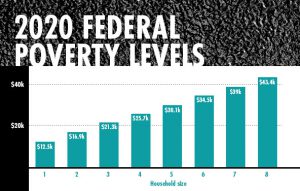
Underwriting can be complicated, and each insurance company handles it differently. To help you understand we will go into detail about why companies underwrite, how it works, and when it applies. We’ll also talk about health conditions that will get your application turned down so you know what steps to take if you are.
Underwriting Basics
Underwriting is how insurance companies find out about your health and decide if they want to take on the financial risk of insuring you. It requires a thorough look at your health history, both on the application and in a follow-up phone interview. If a company thinks you have too many expensive health problems, they can refuse to cover you, limit your coverage, or raise your rates.
Insurance companies underwrite people to keep premiums and risks as low as possible and maintain stability. However, limiting access to Medicare Supplement Plans could mean that the people who need the extra coverage the most don’t get it. Logically, if a company takes on more people with expensive health problems, it will have to pay out more money for claims. To make up for the difference, the insurance company would either charge higher premiums or not let those people on the policy at all.
The federal government sets standards for the different types of Medicare Supplement plans and gives enrollees some protections in the form of guaranteed issue (GI) rights, but they have no control over how insurance companies decide who to accept as a customer. Carriers don’t always agree on what makes an applicant uninsurable.
What Triggers An Underwriting Process
If you want to switch from one Medicare Supplement Plan to another, or switch from Medicare Advantage to Original Medicare and you’re not eligible for IEP, then you’ll trigger the underwriting process. You’ll have to answer a lot of questions about your health. The insurance company can also send you to a doctor or nurse for a medical exam to get a better picture of your current health.
You can change from one Medicare Supplement Plan to another any time of year, but you’ll have to be in good enough health to pass underwriting. To return from a Medicare Advantage (MA) plan to Original Medicare with a Medicare Supplement Plan, you’ll have to wait until the Medicare Annual Enrollment Period, from October 15 to December 7, and pass underwriting.
Underwriting Timeline

Some companies have started using an auto-accept or auto-reject feature in their online applications, but this only works for clear-cut cases where there is no room for confusion. To get an automatic acceptance, an applicant would have to say “no” to every health question and be in great health. Applicants whose answers lead to a “maybe” will have to talk to an underwriter over the phone for further explanation and complete the underwriting process.
How Underwriting Affects Your Premiums
Depending on the carrier, the results of underwriting can cause premiums to increase. Some companies have less strict rules for underwriting, which means they accept applicants with worse health conditions but raise the premium to make up for it. Applicants with more health problems may be put in another pricing tier called “class” or “level.” Companies use this system to try to find a good balance between keeping premiums from going up too much and giving a lot of people access to the policy.
What Conditions Can I Be Denied For?
Companies that offer Medicare Supplement insurance are more likely to charge you a higher premium than to turn down your policy. However, they can still turn down your application. No matter which company you choose, you may not be able to get Medicare Supplement insurance if you have a certain health condition.
Some medical conditions that often lead to a denial are:
- AIDS
- Activities of daily living assistance
- Alzheimer’s
- Atrial fibrillation
- Any history of cancer
- Cirrhosis
- Certain cognitive conditions
- Certain medications
- COPD
- Congestive Heart Failure
- Diabetes not under control with medications
- End Stage Renal Disease
- Heart attack
- Implantable cardiac defibrillator
- Kidney failure
- Multiple Sclerosis
- Nebulizer use
- Parkinson’s disease
- Organ transplant
- Osteoporosis
- Supplemental oxygen use
- Stroke
It’s important to remember that each company has its own rules for underwriting. If one company turns down your application, another may be willing to take on the risk. Working with one of our licensed insurance agents can help you find a “guaranteed issue” policy or a company that will accept your application even if you have health problems.
How To Avoid The Underwriting Process
During certain times when you have guaranteed issue (GI) rights, you will be able to sign up for a Medicare Supplement Plan without having to go through underwriting. During a GI period, insurance companies must sell you a policy without considering your health or any pre-existing conditions. Your Initial Enrollment Period (IEP) is the first seven months after you turn 65, this is when you can sign up for Original Medicare without being penalized.
Your Medicare Open Enrollment Period (OEP) is usually part of your Initial Enrollment Period (IEP). This is when you have a GI right to sign up for a Medicare Supplement Plan. The OEP starts on the first day of the month that you start getting Medicare Part B. It lasts for six months, during which time you can sign up for any Medicare Supplement Plan letter with any insurance company, no matter how healthy you are.
In rare cases, you may be eligible for a Special Enrollment Period, which also gives you the right to a Guaranteed Issue, where you can change your policy without having to go through the trouble of underwriting. There are also parts of the underwriting process you can avoid such as the medical exam. Some states let you change your Medicare Supplement plan without having to go through a medical exam:
 California
California
You can switch plans around the time of your birthday during a 91-day Open Enrollment Period because of a rule called the “birthday rule.”
Connecticut
Guaranteed Issue is always the case with Medicare Supplement plans in Connecticut. In this state, you have to use community rating methods. But Connecticut is one of the states where Medicare Supplement costs the most.
Idaho
Idaho has a rule that starts on your birthday and lasts for 63 days to sign up for Medicare Supplement Plans.
Illinois
The Illinois birthday rule is a bit more complicated. Only Medicare Supplement policyholders in a certain age group can use it for 45 days.
Louisiana
In Louisiana, the birthday rule gives people 93 days to sign up for Medicare Supplement Plans.
Maine
Beneficiaries in Maine can switch to plans with the same or less benefits during the month of June without having to go through an underwriting process.
Missouri
There is an anniversary rule that lets people change companies without having to go through underwriting for 62 days. Instead of your birthday, the time is based on the date of the policy.
 New York
New York
New York Medicare Supplement is expensive, but you can get a policy that covers you no matter what.
Oregon
Oregon has the “birthday rule,” which says that you have 30 days after your birthday each year to change your Medicare Supplement plan.
Vermont
Some Vermont private insurance companies don’t ask about health at all times of the year.
Washington
beneficiaries in Washington state can switch from one policy to another at any time (except for Plan A).
Does Medicare Use Underwriting?
Original Medicare doesn’t use underwriting. The federal government gives this insurance to people over 65 or who have been on Social Security disability for at least 24 months. Underwriting is not used for Medicare Advantage plans or Medicare Part D drug plans. Anyone can sign up for these insurance plans. Keep in mind you can’t have both a Medicare Advantage plan and a Medicare Supplement plan at the same time.
Comparing Plans With EZ
When looking for a Medicare Supplement Plan, it’s important to compare the costs and benefits of each one. That means you’ll have to do a lot of research, which can take a long time since you’ll have to call numerous insurance companies to – receive price quotes. But if you work with an agent from EZ, you can compare prices in half the time. Working with a licensed agent gives you access to many Medicare Supplement Plan carriers and plans in one place.
In addition to giving you price comparisons, your agent can tell you how each plan is different. Also, your agent can help you compare out-of-pocket costs with premium costs to figure out which plan will save you the most money over time. Call us today at 877-670-3602 to start looking for a Medicare Supplement Plan.







